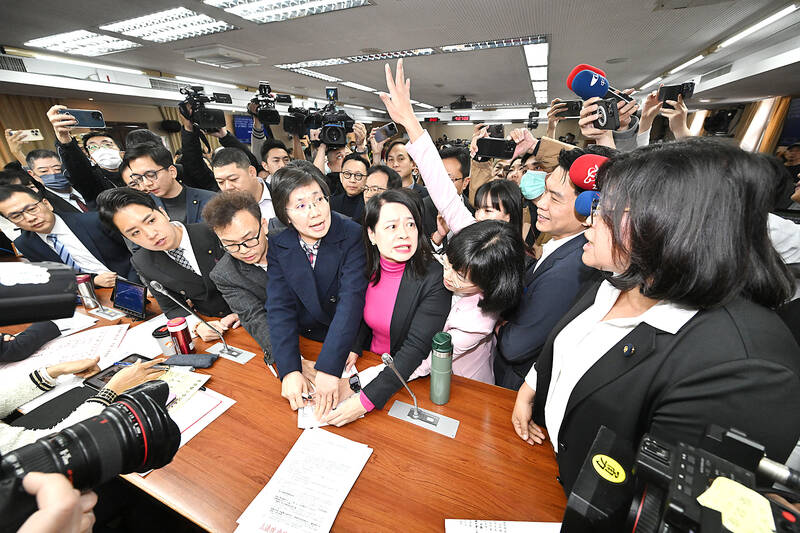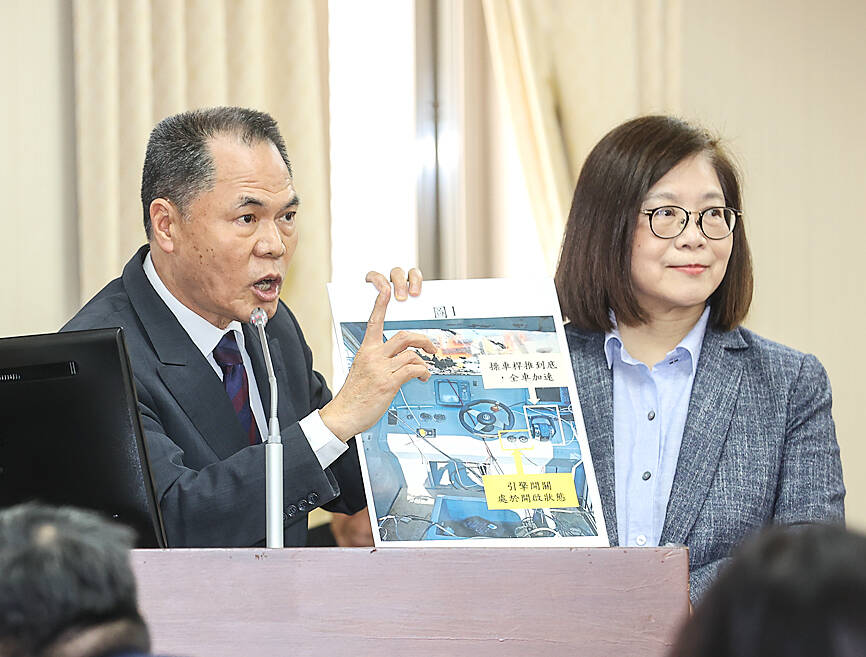A Chinese boat that had entered prohibited or restricted waters around Kinmen County last month capsized because it was operating at high speed and was overloaded, and not because it was hit by a Coast Guard Administration (CGA) vessel, Ocean Affairs Council (OCA) Vice Minister and CGA Director-General Chou Mei-wu (周美伍) told lawmakers yesterday.
Chou, along with OCA Minister Kuan Bi-ling (管碧玲) and Mainland Affairs Council Minister Chiu Tai-san (邱太三), was at a meeting of the legislature’s Internal Administration Committee to present a report on the Feb. 14 incident, in which two Chinese fishers fell into the water and drowned while they were being pursued by Taiwanese coast guards.
Independent Legislator May Chin (高金素梅), a committee co-convener who presided over the meeting, listed the title of the presentation as a “collision involving a Taiwanese coast guard vessel and a Chinese fishing boat.”

Photo: Tu Chien-jung, Taipei Times
However, the OCA titled its written report as an incident that occurred during the CGA’s crackdown on a Chinese boat in the nation’s waters.
The start of the meeting was delayed for 30 minutes as lawmakers across party lines raised the point of order. KMT lawmakers demanded that Kuan apologize for unilaterally changing the presentation’s title, saying it showed her contempt and disrespect for Chin and other lawmakers on the committee.
Kuan did not apologize, but said she had texted Chin and asked for consideration given the case’s extenuating circumstances.

Photo: CNA
Chin said she had accepted Kuan’s explanation, but she said she could not speak for other lawmakers, and ruled that the meeting be resumed after finalizing the title of the presentation as a “collision involving a Taiwanese coast guard vessel and a Chinese fishing boat.”
Kuan said that while she is willing to accept personal criticisms for changing the title of the presentation, she must defend the CGA’s position.
The committee’s chosen title did not distinguish between “deliberately hitting” the Chinese fishing boat and “bumping” into it, she said.
Chou said he disagreed with the description that the incident was a collision, as Taiwan and China are still negotiating over proper settlement of the dispute.
“I cannot accept the description. We were cracking down on an unlicensed, unnamed and unregistered boat, and defending our sea borders and rights of legal fishers,” he said. “If we call this a collision, the Chinese would blame us for causing the incident and hold us liable for it.”
The government’s position is that all evidence would be investigated and examined by the judicial system and an impartial third party, he added.
The CGA had since Feb. 12 received reports from Kinmen County residents about Chinese boats illegally entering the nation’s waters to fish and smuggle products, he said.
“The CGA’s patrol boat, CP1051, was already at sea on Feb.14. It quickly reached the Chinese fishing boat after our radar system detected that the boat was about to enter Taiwan’s prohibited and restricted waters,” he said.
CP1051 crewmembers followed standard operating procedures by asking the crew on the Chinese boat to slow down so they could board it for inspection, Chou said.
“The Chinese boat then made a wide turn to the right at high speed to avoid inspection, with its crew putting the rudder over to the right at the maximum degree,” he said.
“Aside from two onboard motors of 400 horsepower in the back, the boat was equipped with a net-collecting machine on the right. All these machines are heavy and would have caused the boat to tilt upward to the right, making it prone to capsizing when it makes a right turn at full speed,” he added.
The captain of the fishing boat bought it in January and had operated it fewer than 10 times without a license, Chou said.
The CGA’s radar system had recorded the direction and speed at which the Chinese vessel was operating on its radar system, he said, adding that the data are being analyzed by prosecutors.
Chou also showed pictures to rebut allegations that the CGA’s larger vessel deliberately hit the small fishing boat.
“Their boat is 11.6m long, 2.7m wide and 1.85m deep, while ours is 9.6m long, 2.8m wide and 0.7m deep,” he said. “If the CGA’s boat had hit the fishing boat at 40 nautical miles per hour [74kph], the Chinese boat would have broken into pieces. However, neither a hole nor a dent was found on the CGA’s boat, and only a small crack was found on the Chinese boat’s port side rafter.”
As for accusations that rescuing the fishers had been deliberately delayed, Chou said Taiwanese coast guards were able to rescue the four Chinese who had fallen into the water within three hours as divers had to be contacted to search for the last victim.
“The CGA central command center had called for an ambulance to stand by at the harbor when the drowned and injured fishers were brought to shore,” he said, adding that the ambulance had recorded the time of the assignment.

CHAOS: Iranians took to the streets playing celebratory music after reports of Khamenei’s death on Saturday, while mourners also gathered in Tehran yesterday Iranian Supreme Leader Ayatollah Ali Khamenei was killed in a major attack on Iran launched by Israel and the US, throwing the future of the Islamic republic into doubt and raising the risk of regional instability. Iranian state television and the state-run IRNA news agency announced the 86-year-old’s death early yesterday. US President Donald Trump said it gave Iranians their “greatest chance” to “take back” their country. The announcements came after a joint US and Israeli aerial bombardment that targeted Iranian military and governmental sites. Trump said the “heavy and pinpoint bombing” would continue through the week or as long

TRUST: The KMT said it respected the US’ timing and considerations, and hoped it would continue to honor its commitments to helping Taiwan bolster its defenses and deterrence US President Donald Trump is delaying a multibillion-dollar arms sale to Taiwan to ensure his visit to Beijing is successful, a New York Times report said. The weapons sales package has stalled in the US Department of State, the report said, citing US officials it did not identify. The White House has told agencies not to push forward ahead of Trump’s meeting with Chinese President Xi Jinping (習近平), it said. The two last month held a phone call to discuss trade and geopolitical flashpoints ahead of the summit. Xi raised the Taiwan issue and urged the US to handle arms sales to

BIG SPENDERS: Foreign investors bought the most Taiwan equities since 2005, signaling confidence that an AI boom would continue to benefit chipmakers Taiwan Semiconductor Manufacturing Co’s (TSMC, 台積電) market capitalization swelled to US$2 trillion for the first time following a 4.25 percent rally in its American depositary receipts (ADR) overnight, putting the world’s biggest contract chipmaker sixth on the list of the world’s biggest companies by market capitalization, just behind Amazon.com Inc. The site CompaniesMarketcap.com ranked TSMC ahead of Saudi Aramco and Meta Platforms Inc. The Taiwanese company’s ADRs on Tuesday surged to US$385.75 on the New York Stock Exchange, as strong demand for artificial intelligence (AI) applications led to chip supply constraints and boost revenue growth to record-breaking levels. Each TSMC ADR represents

Pro-democracy media tycoon Jimmy Lai’s (黎智英) fraud conviction and prison sentence were yesterday overturned by a Hong Kong court, in a surprise legal decision that comes soon after Lai was jailed for 20 years on a separate national security charge. Judges Jeremy Poon (潘兆初), Anthea Pang (彭寶琴) and Derek Pang (彭偉昌) said in the judgement that they allowed the appeal from Lai, and another defendant in the case, to proceed, as a lower court judge had “erred.” “The Court of Appeal gave them leave to appeal against their conviction, allowed their appeals, quashed the convictions and set aside the sentences,” the judges